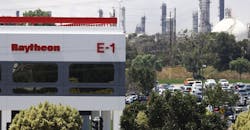Activist investor Dan Loeb came out against United Technologies Corp.’s tie up with Raytheon Co., saying the deal is “ill conceived” and makes neither financial nor strategic sense.
The chief executive officer of Third Point -- which owns a stake in United Technologies worth about $836 million -- plans to vote against the deal, Loeb said in a letter to the company’s board. It undervalues United Technologies’ aerospace unit and CEO Greg Hayes is pushing ahead with the pact for the wrong reasons, he said.
“Since there is no strategic or financial rationale for this transaction, we can only conclude that the merger was motivated by empire building and Mr. Hayes’ desire to extend his already long overdue tenure as head of a Fortune 100 company,” Loeb said in the letter released Friday, confirming a report in Bloomberg News.
Representatives for United Technologies didn’t immediately comment. A representative for Raytheon didn’t immediately respond to a request for comment.
Third Point invested in United Technologies in part because Hayes had promised that its plan to break up into three parts would lead to an orderly CEO transition over the next year or two and a potential upgrade in management, Loeb said.
“We were alarmed to learn that Mr. Hayes signed a new sweetheart employment agreement that would entrench him for another half a decade ultimately as both CEO and chairman of the board,” Loeb said. “We believe this to be a case of disastrously bad corporate governance.”
Market Reaction
Raytheon fell 1% to $176.27 at 9:41 a.m. in New York trading Friday while shares in United Technologies were little changed.
Reaction to the Raytheon tie-up has been thoroughly mixed, with both companies’ shares falling slightly since the deal was announced June 9, trailing the broader market. While analysts at Cowen and Vertical Research Partners have upgraded United Technologies recently, Agency Partners in a June 10 note called the merger “illogical” and said that “it is hard to avoid the conclusion that this deal is about size for size sake.”
Shareholder opposition would appear to be the biggest threat to the deal. Analysts expect limited pushback from antitrust regulators given the small overlap between United Technologies and Raytheon. The Pentagon has begun reviewing the deal and will submit its views to the Justice Department or the Federal Trade Commission.
Before the anticipated closing in the first half of 2020, United Technologies plans to spin off the non-aerospace operations that make elevators and air conditioners.
Strategic Rationale
Loeb remained unconvinced of the strategic rationale for transaction, which management has said is primarily focused on technology.
“We can appreciate why Raytheon is interested in UTC technology to further its competitive position in areas including hypersonics, directed energy weapons, and air traffic management,” he said. “However, Raytheon brings very little applicable technology to UTC’s aerospace offerings.”
Raytheon’s cyber and data analysis, for example, could be replicated through commercial relationships or supply agreements, he said. He pointed to similar arrangements between General Electric Co. and Safran SA as well as Airbus SE and Palantir Technologies Inc.
Loeb also questioned the timing of the deal and valuation ascribed to the remaining aerospace business. He said the deal undervalues aerospace division at roughly $80 a share. He believes it would be worth $115 apiece after stripping out $1.1 billion in expected losses. The company should wait until after the breakup before pursuing a deal as well because the shares were trading at a “heavily discounted valuation,” Loeb said.
The projected free cash flows and synergies didn’t justify the need for the transaction, he said, adding that the combined company would also trade at a lower multiple than United Technologies would on its own.
“The merged entity will likely trade on a defense multiple when defense is out of favor and trade on an aerospace multiple when aerospace is out favor,” he said.
He also called the timing of deal “irresponsible” and said it introduced unnecessary risk at a time when United Technologies is in the midst of integrating Rockwell Collins Inc. and splitting up the remaining parts of the company. He said he was worried that it may have already distracted from efforts to find a suitable partner for its Carrier unit.
“We are concerned that execution will slip further as management becomes increasingly distracted,” he said.
Loeb’s Third Point joins fellow activist Bill Ackman, who sent an email to Hayes when reports emerged about the deal in which he also questioned the strategic rationale. Ackman warned at the time he planned to oppose the deal, publicly if necessary, because it would be funded by a “highly dilutive” share issuance when the stock is already trading at a discount.
Loeb said the Raytheon deal raised other issues at the company.
“The merger proposal makes us increasingly uncomfortable with a management team that already has a poor track record. Under Mr. Hayes’ leadership and long tenure in the C-suite, most business units within UTC including Otis, Carrier, Pratt & Whitney, and Sikorsky have underachieved and trailed their peers in performance,” Loeb said.
About the Author
Bloomberg
Licensed content from Bloomberg, copyright 2016.
